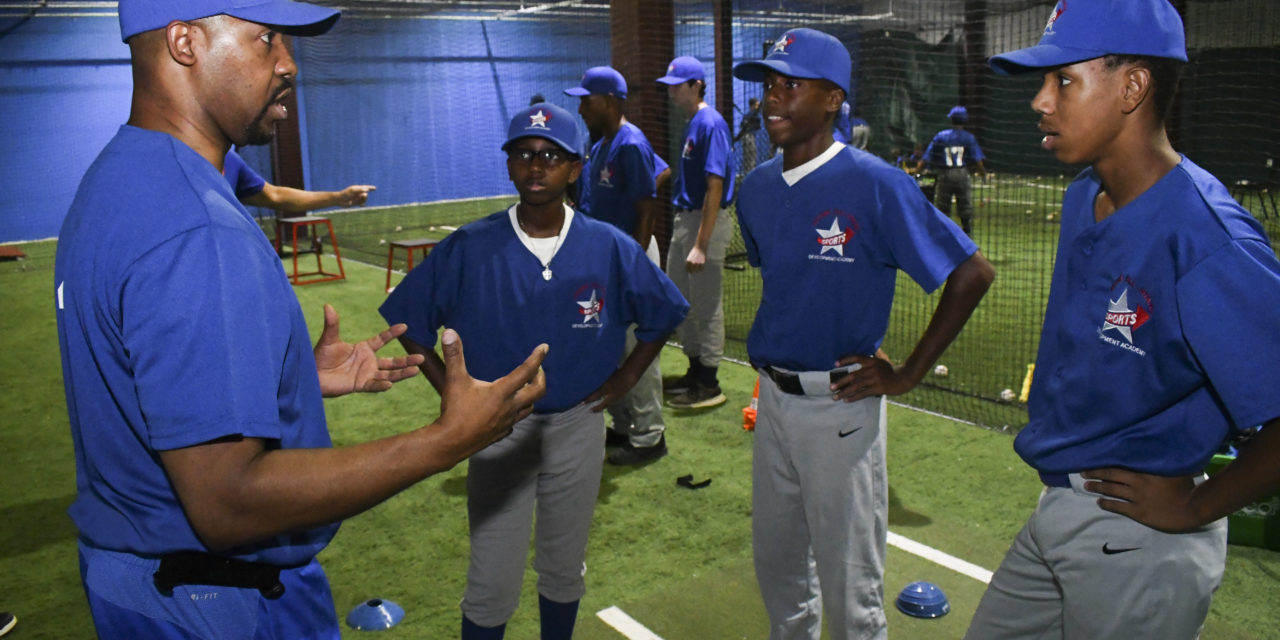The former MLB manager’s Future All-Stars academy preaches, “Enough with all the games, let’s focus on development.”
Bo Porter is a former MLB player, coach, manager and executive. He recently completed his second season as a baseball analyst for The 2019 MLB World Champion Washington Nationals on MASN, and he’s a prime candidate to receive some heavy looks for another MLB managerial job in the near future.
Helping to elevate and diversify the baseball culture of tomorrow is also important to the former Houston Astros manager. Bo has some very strong opinions on how to improve grassroots efforts to inspire and develop the next generation of baseball players.
CORE Magazine sat down with Porter, who started Future All-Stars Sports Development Academy, to correct some of the misinformation and expose some disingenuous, money-grabbing side of the increasingly lucrative culture of Youth baseball and training.
Bo discussed his message for the youth players, parents and coaches and offered his professional solution for health, happiness, and maximum development.
Youth baseball is a 365-day per year revenue-generating industry now, but Bo, a former three-sport athlete, doesn’t believe that playing year-round helps their development.
“I’ve seen too many young players sacrifice game-refinement for the pursuit of plastic trophies, meaningless rings, and fleeting, misplaced glory,” Porter told CORE.
Bo holds true to his baseball virtues while masterfully adapting to a changing baseball landscape. He stays connected to the game and passes along the jewels he’s acquired in his 25 years in the game.
During the summers, Porter offers his professional experience to the gifted players of MLB’s various diversity programs such as Hank Aaron invitational, Dream Series and Breakthrough series, where minority players are awarded top-flight development to close the financial gap and lack of resources that impede certain kids from playing the game.
If not for a helping hand from a local neighbor, Porter’s baseball journey would have never gotten off the ground. It drives his desire to return the favor and pay it forward.
CORE: Talk About The Bo Porter Future All-Stars Sports Development Academy.
Bo Porter: Playing a lot of games isn’t the answer. I want parents, coaches, and players to realize that rest and recovery are essential to staying healthy and maximizing productivity. If these changes are taking place at the highest level, what’s stopping this mindset from becoming more common practice for our greatest resource to keep America’s favorite pastime thriving for years to come?”
“Well, Future All-Stars Baseball, located in Houston, Texas, specializes in DEVELOPING youth baseball players, advising parents and coaching coaches.
Future All-Stars Baseball has programs for kids ages 5-18 and would love the opportunity to help your son reach his full potential.
Bo’s Future All-Stars Baseball does not have travel or select teams that will leave kids on the outside looking in. My intention is to bring the academy to every city in the country.
CORE: Why is it so important for young players to balance their grind? Why is playing too many games bad?
Bo Porter: I want to discuss a topic that is derailing so many youth baseball players before they ever have a chance.
My focus is not on the 1 percent that gets to play Major League Baseball. It’s about what you can DEVELOP into even if you never accomplish the dream. Building strong members of the baseball community helps to expand the culture of baseball and push it further.
What you become on your journey to reach a level reserved for the best of the best can properly prepare you for the challenges that come with life. I believe sports is an institution of higher learning, and the habits, accomplishments, and failures you encounter can teach whole-person DEVELOPMENT.
Over the years, I’ve mentored, trained and advised parents and players about this seemingly inflammable concept that playing as many games as possible is actually a good thing.
IT IS NOT!
CORE: Why isn’t playing a lot helpful for youth players?
Bo Porter: There are also more youth baseball players getting injuries than ever before.
Burnout is real and physical fatigue can lead to injuries more times than not. That’s why every Major League Baseball organization employs strength and conditioning coaches to monitor the workload of players, many have made a considerable investment to monitor sleep patterns, and every organization has a personal chef and nutritionist.
CORE: Why Is Whole Person Development A Crucial Aspect of Your Academy Goals?
Bo Porter: As a former Major League player, coach, manager, front office executive, and now broadcast analyst, I’ve been asked by countless parents and youth baseball players about the proper balance needed to help DEVELOP a youth baseball player’s skills to reach their full potential.
I always start by saying, ‘Make sure whatever baseball program you join places a premium on whole-person development.’ It’s paramount to the overall success of youth baseball players today and in the future.
CORE: Can you relate this philosophy to your own professional journey?
Bo Porter: Let me give some background on my personal development as a youth.
I was born and raised in Newark, NJ and the winter months were never conducive to playing baseball outside. WHAT A BLESSING that turned out to be.
As a result, during the fall and winter, I played football and basketball. The weight training and physical contact during football season helped build toughness and strength.
Playing basketball gave me all the conditioning, agility and plyometrics needed to improve my endurance, lateral quickness and explosiveness. I never picked up a baseball bat or fielding glove from August through March of the following year.
Please let that sink in…
During my high school career, I was blessed to earn All-State honors in football, basketball, and baseball. I went on to the University of Iowa to play football and baseball.
In college, during the fall, I played ONLY football. In the Spring, I played baseball. After earning All-Big Ten honors in football and baseball for the Hawkeyes, I was drafted by the Chicago Cubs after my junior year.
I signed with the Cubs but returned to Iowa for my senior year of football and graduated with a degree in Communication Studies (EDUCATION IS THE ULTIMATE GAME CHANGER!)
CORE: What do you mean by “Specialization After Experimentation”?
Bo Porter: After graduation and years of playing both football and baseball, I finally at the age of 21, committed solely to baseball. After my first full season in the Minor Leagues, I realized how difficult the grind of the season was mentally, physically and emotionally.
So that off-season, I finally had a chance to properly prepare for an upcoming baseball season. I played no live games but started training in October with a focus on building strength, endurance, and explosiveness.
My entire off-season program was centered around developing my mind, body and baseball skills. I pushed myself beyond what I believed to be my personal comfort zone. It was an intentional and deliberate effort to master my craft.
My years of commitment and development were rewarded when I made my Major League Baseball debut for the Chicago Cubs. I was the 15,057th player in Major League Baseball history.
I was blessed to play in the Major Leagues for the Chicago Cubs, Oakland A’s and Texas Rangers.
I’m sharing my story because parents and players need to hear this from credible sources, and I’m now using my many experiences to help prepare others who possess the commitment and desire to maximize their chances by properly DEVELOPING them in all aspects of their lives.
CORE: What’s your opinion on The Facts vs.The Myths Of Youth Development?
Bo Porter: Here’s what I know to be true: committing to a well-designed off-season workout program will enhance your skills more than simply playing baseball games. Practice is a controlled environment where you can work with a purpose and develop specific skills.
Bo is not alone in this opinion. There’s a legion of Baseball Nation, including former MLB coaches, players, and announcers, who feel the same.
When you focus on DEVELOPING your baseball skills, you will inadvertently strengthen other characteristics such as using physical activity to promote a healthy lifestyle, the value of time management, work ethic, perseverance, and commitment.
The above-mentioned attributes and more will undoubtedly enhance your baseball skills and DEVELOP the whole person.
CORE: Would you agree that there’s too much dream-selling and not enough development in youth baseball?
Bo Porter: But here’s the problem. There are so many travel baseball programs to choose from, and most DO NOT focus on development. They’re more geared towards playing as many games as possible. There are countless tournaments available throughout the country, so playing games has become the de facto solution many parents, players, and coaches have employed to help youth baseball players improve their skill level.
Many parents, players and coaches are living in what I call the transactional short-term gratification space where they’re more concerned with winning a 14U tournament championship trophy or a meaningless costume ring.
CORE: You’ve addressed these concerns on the MLB as well and advised the league on some transformational changes that will cure these ills. What are they?
Bo Porter: In my 26-year professional career, I’ve worked for nine organizations and attended Instructional League on six different occasions.
Instructional League consists of the organization’s top prospects and traditionally takes place a few days after the Minor League season ends and lasts about seven weeks.
Players normally get intensified instruction in the morning and play games in the afternoon. I always believed that players would gain more from the Instructional League if you excluded the live games… and I shared that opinion.
It was refreshing to know that my once out-of-the-box thought is being implemented by MLB organizations.
As organizations look for best practices to improve players, I’ve been informed that the Colorado Rockies will take a step in the right direction this off-season by restructuring the traditional Instructional League format.
In a day and age when youth baseball players are looking to play more and more games, it’s encouraging to see one of our MLB organizations lead the charge in changing the narrative.
Here’s an overview of the changes:
1. They’ve changed the name to reflect the change in thinking. They will use the phrase “Fall Development Program.”
2. The program would normally run from mid-September to early October, which meant the players would report immediately following their Minor League season.
3. The season will start on November 7th and ends on November 20th. This newly organized Fall Development Program will mostly focus on player development and consist of intensive individual on-field work and team fundamental on-field work, leadership development and mental skills development.”
Especially noteworthy for parents, coaches, and youth players:
4. The new schedule will allow the players an opportunity to REST & RECOVER from a long season before reporting to the Fall Instructional Program.
5. They cut the length of the program in half but intensified the workload.
6. The program will not include PLAYING GAMES and is 100% focused on DEVELOPMENT!
If you’re looking for a baseball DEVELOPMENT program for your son or want Virtual Coaching and Consulting Lessons with Bo Porter, visit www.boporterfass.com for more information about Bo Porter Future All-Stars Baseball Development Academy.
The programs are filling up fast!


 CLICK HERE
CLICK HERE
